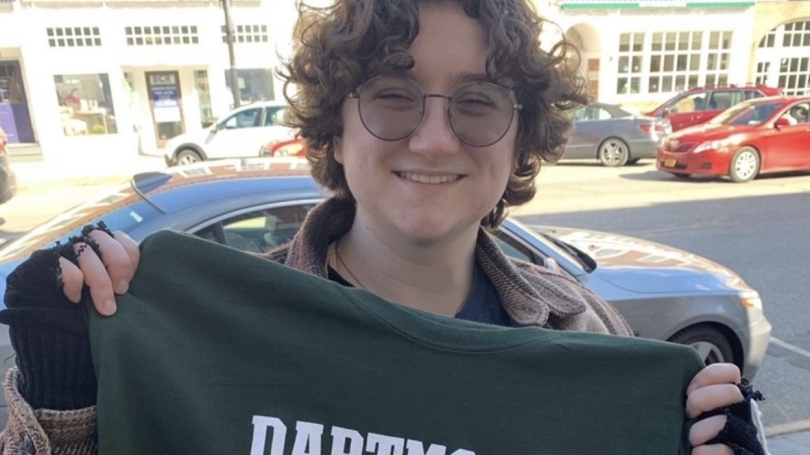
- About
- Programs & Initiatives
- Alumni
- News & Events
Back to Top Nav
Back to Top Nav
Alexander Campbell reflects on the Global Impact Summit
I have dubbed my sophomore summer my "Summer of Food."
Firstly, I'm taking two food-related classes: Agroecology (ENVS 25) and Sustainable Food Systems (ENVS 14), both with Professor Theresa Ong. I've learned a lot about the systems which bring food from farms to our tables, and simultaneously marveled at how divorced the modern person is from their food. We're still eating it, of course – but very few of us know where it comes from, or even what's in a lot of the food we're eating.
This learning has impacted not only my "Summer of Food," but my worldview and my relationship with food. I've begun going to the Norwich Farmers' Market each week, doing my own grocery shopping, and cooking for myself. Not only have I gained valuable life skills during this shift, but it's made me feel more connected to my food.
The specific catalyst for this personal transition was the Matariki Global Impact Summit, held by the Dartmouth Center for Social Impact (DCSI) at the Moosilauke Ravine Lodge. The Global Impact Summit has a different theme every year, and this year the theme was Food.
Day One
The Summit began on a beautiful Saturday morning at the DCSI building in Fairbanks Hall, where our small group of students met up for the first time for a group breakfast.
We soon migrated to Rauner Special Collections Library for a short Workshop where we talked with Morgan, the Librarian for Teaching & Scholarly Engagement at Rauner, about the history of the concept of "The Dartmouth Man," and what kind of power the alumni connections have historically wielded in forming our world, our politics — and our food systems. This power, we discovered, was not always wielded for good, but often for selfish desires. It provided an interesting framing for the trip: a reminder that, as Dartmouth students, we can take what we learn in our time here, and it is up to us whether we use it for good. It was a reminder that we have a responsibility to take our learning from this Global Impact Summit, and use it to make a better world.
I had much time to ponder this, as we made the picturesque drive up to Moosilauke Ravine Lodge.
After some lunch, community building, and explanations about the day ahead, we had our first workshop of the day. We talked to two professors: Professor Theresa Ong from the Environmental Studies Department, also my professor for Agroecology and Sustainable Food Systems; and Professor Mario Machado from the Latin American, Latino, & Caribbean Studies Department, who has a homestead-in-progress and has done research on food system transitions in Cuba. We asked them lots of broad questions about sustainability; food systems, especially their resilience in the face of climate change; and the overlap of food systems, energy systems, and economic systems. We asked about where they saw hope for the future of food systems, what they know about recent "trends" in food systems, and how the future of food systems is unfolding. Both professors had an incredible breadth of knowledge, and were able to answer our many questions, which gave us a great foundation for our understanding of food systems, and why it is the topic of a Global Impact Summit.
Our second workshop was with Upper Valley practitioners, who are intimately involved with the food systems in the region (context: the "Upper Valley" refers to the geographical area in which Dartmouth is situated – a Valley that spans between Vermont and New Hampshire). We broke up into small groups to talk to each practitioner. My small group talked with Allan Reetz, Director Public & Government Affairs at Hanover Co-op Food Stores. We learned about the history and inspiration behind the Co-op stores, what their values are, and how and why they operate the way that they do. Talking with Allan gave me a lot of hope – that there are good actors, not just huge multinational corporations managing our access to food.
After my small group's discussion with Allan, we had a panel with all the student groups present, moderated by one of the DCSI summit leaders, where I got to learn about the other practitioner – Chuck Wooster, a Dartmouth '89 and owner of Sunrise Farm in the Upper Valley. This Q&A style panel was informative in a different way from the first workshop: instead of broad, general, academic-oriented and historical background information (which definitely has its place and value), we got to talk to people actually doing work, playing parts in the system we've been discussing and abstracting.
After this workshop, we had a bit of free time before dinner, which consisted of hanging out in the creek, getting to know my peers on the trip better: learning their majors, passions, and what led them to apply for this summit. Our evening rounded out with a classic Moosilauke Lodge Dinner, fabulous as ever. After a few more hours of free time, the group tucked into bed early (voluntarily! it had been a long, informative, but tiring day).
The next morning, after breakfast, the small groups each gave a project presentation. We took everything that we had learned over the last 24 hours, and endeavored to translate it into a program or policy change designed for Dartmouth Dining, with the goal of increasing its sustainability as an actor in the Upper Valley food systems. It was really exciting to take our learning and apply it to an actor within the region's food system that we all had interacted with extensively; it was an engaging, tangible way to focus our attention on local, actionable solutions, and it felt very empowering.